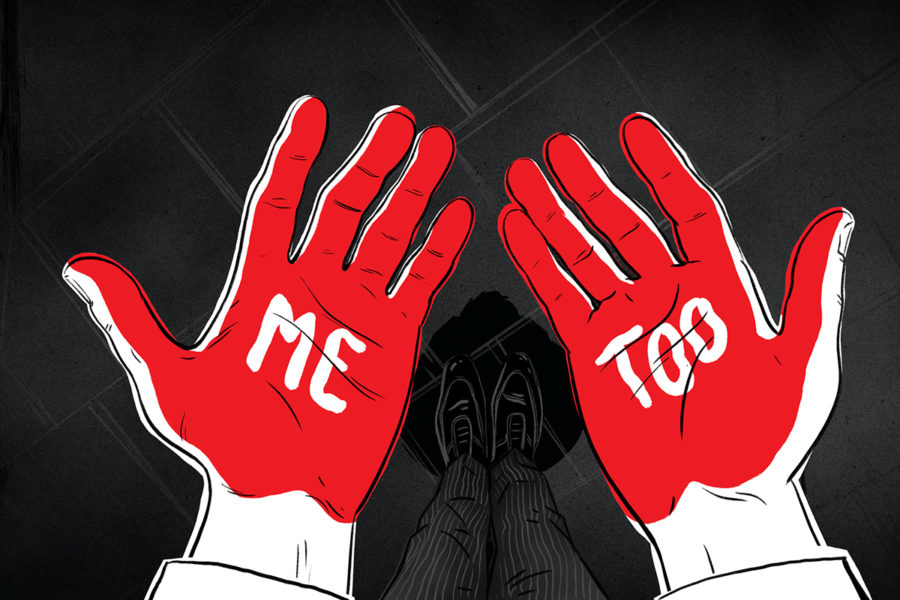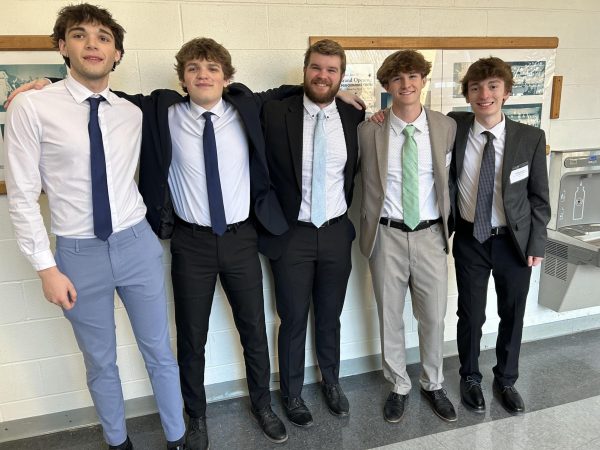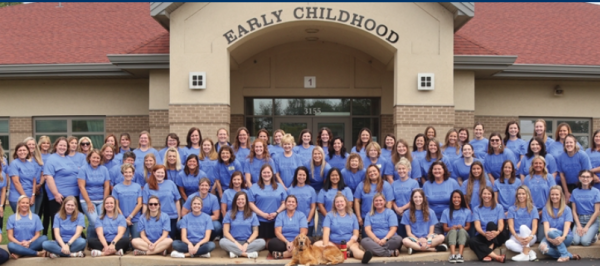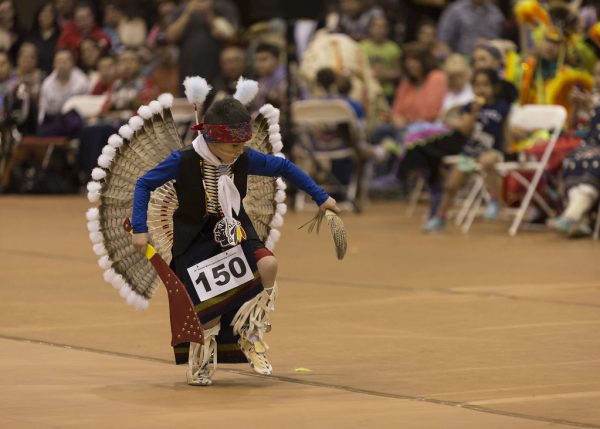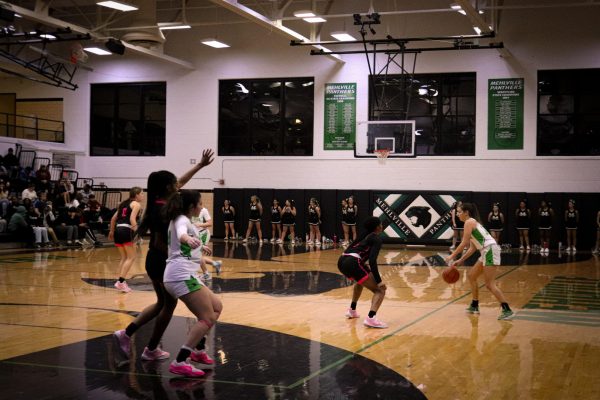The Group Isolated from the #MeToo Movement
The #MeToo era has helped women come out and share their experiences with sexual assault, but there’s one group the movement’s forgotten about: men.
This piece was featured in April’s Mehlville Media Magazine, the fourth and final issue of the 2018-19 school year. Stop by room 116 for extra copies and for more information about our program.
“And it’s here with every woman who chooses to say, ‘Me too.’ And every man — every man — who chooses to listen.” said Oprah Winfrey at the 2018 Golden Globes. This award ceremony was an important one for survivors of sexual assault in Hollywood. Big names like Harvey Weinstein, Kevin Spacey and more were accused of sexual assault by their female colleagues.
Tarana Burke, social activist, and Ronan Farrow ,journalist, coined the term #MeToo when talking about sexual assault in New York and Farrow’s articles helped uncover allegations against Weinstein. Women started coming forward about being victims which inspired more women to come out and tell their stories. The #MeToo movement was beginning and despite the controversies and hate these victims received, it’s changed views on sexual assault for abusers and victims.
“It [the #MeToo movement] lets them know that it’s not their fault, that people will listen, and that they are not alone. It allows them to heal themselves and others” said Shawn Kurtz, sophomore.
While everyone was praising women for sharing their stories, the media was shaming men for their actions, not taking into account that male victims also exist. While assaulters should be held accountable for their actions, the media focuses on men being rapists, and only rapists.
Even students of Mehlville recognize this as an important issue, putting in their opinions despite not being experts.
“Male victims of rape think that it’s not possible that they were raped because they’re supposed to be strong and would never be taken advantage of in that way,” said Kylie Wheaton, sophomore.
The biggest reason Hollywood and the media ignores male victims of sexual assault is because it happens less often. According to the National Sexual Violence Resource Center, one in every five women and one in every 71 men will be raped at some point in their lives. Due to this gap in reported cases, it makes it harder to believe male survivors even more so than it does female survivors.
Although it’s a small number, male victims still exist so they must be taken into account when talking about sexual assault. Rape is not the same thing as sex. Rape is about having control over another person and anyone of any gender can have this control.
Many reasons exist for why victims don’t come forward after a sexual assault has occurred. Some victims don’t realize or accept that what happened to them was a sexual assault. A huge reason is backlash from the people around them. Victims are faced with the fact that if they come forward, they can lose their jobs, family members, friends and anything else important in their lives.
Victim blaming is when victims are held accountable for crimes they didn’t commit. This is extremely prominent in rape cases which is yet another reason why survivors are scared to come forward. With all of these reasons, it makes it hard for women to come out and tell their stories. Male survivors go through all of these hardships and more because of what society expects of men.
“People expect men to always be “wanting it” so they assume that sexual assault to men isn’t really as bad as it is for women,” said Stephanie Wiemann, sophomore.
Men are faced with society telling them that what happened to them must have been consensual because men are expected to want sex at anytime of the day. This leads to problems when men come forward because society has taught us that men always want sex.
In an article published in The Washington Post, after the explosion of allegations against Harvey Weinstein, actor and former NFL player, Terry Crews came out with his own story of sexual harassment. A man alledgedly groped Crews at a party. The reason he didn’t come forward for a while was because his abuser was a Hollywood executive and a man in a position of power.
Crews has been an advocate for male survivors and the #MeToo movement and has continued to advocate even after being mocked and made fun of for what he went through.
When coming forward about a sexual assault allegation, survivors face criticism, jokes and comedy directed towards their experience. These types of jokes are most common with male victims because of the way society treats them.
Even in the #MeToo era, rape jokes are still being told. Prison rape is a punchline in many movies and comedy shows. These jokes cause people to laugh at male victims instead of acknowledging their experiences. This adds to yet another reason why victims are afraid to come forward.
Toxic masculinity plays a big role in rape accusations and men’s lives in general. The idea that men can’t do anything deemed as “feminine” or they’ll be seen as less of a man is a problem. It normalizes men not showing emotions, being violent, unhygienic etc.
Amy Eisen Cislo, Senior Lecturer in Women, Gender, and Sexuality studies at Washington University in St. Louis, describes this notion as “hegemonic masculinity,” the idea of men being figures of inherent dominance.
“Hegemonic masculinity is really this ideal notion of masculinity that is generally unattainable, but we tend to, as a culture, emphasize the importance of it.” said Cislo.
When men are victims of sexual assault, they aren’t taken seriously because of the way toxic masculinity, conditions people to think about them. Men are seen as sensitive or overreacting when they come forward; traits that are most commonly associated with women.
With all of these hardships, there are people who advocate for male victims, but not in the right way. If the only time male victims come up in conversations are to shut down female survivors, it is not advocacy. If a woman is speaking about her experience and someone shuts her down to talk about how “men get raped too,” it makes it seem like her experience and story is invalid. “Men get raped” should be its own statement, not an addition to a female survivors story.
“It is not a non-victims place to step in and speak over the victims, but instead just to support change.” said Wheaton.
There is a role for non-victims in the #MeToo movement. The role is supporting and believing survivors. Non-victims should not put in their opinion about how they think an assault happened or how a victim should handle it.
In the #MeToo era, it’s important to include all survivors of sexual assault or abuse regardless of race, socioeconomic status or gender. #MeToo has changed the taboo around these victims, but it still has more change to be made, especially when talking about men.

Samra Selimovic is starting her second year as a junior in journalism. She is interested in reporting her opinions on current events and writing features...


